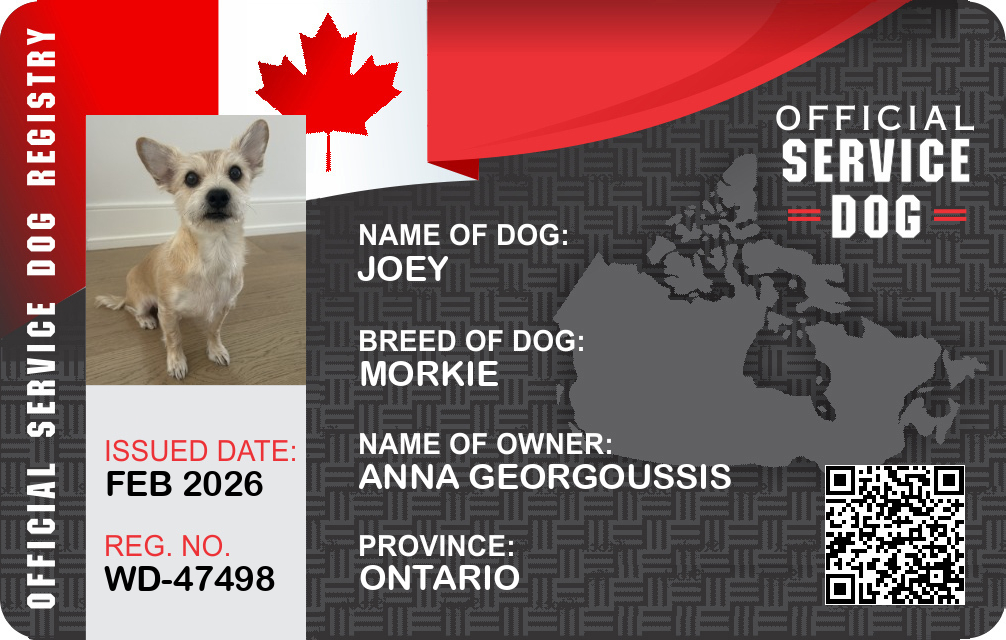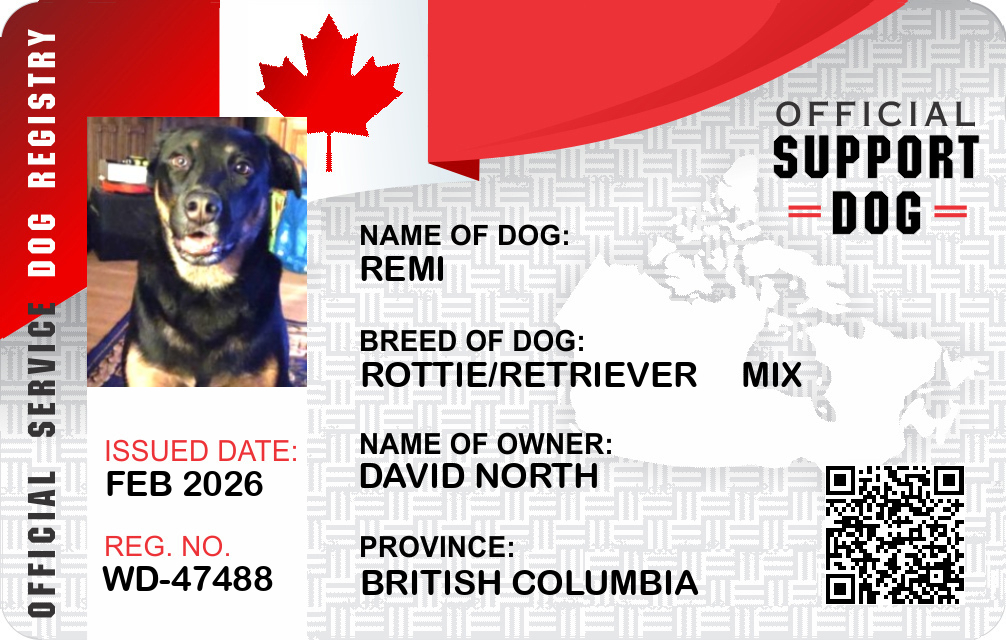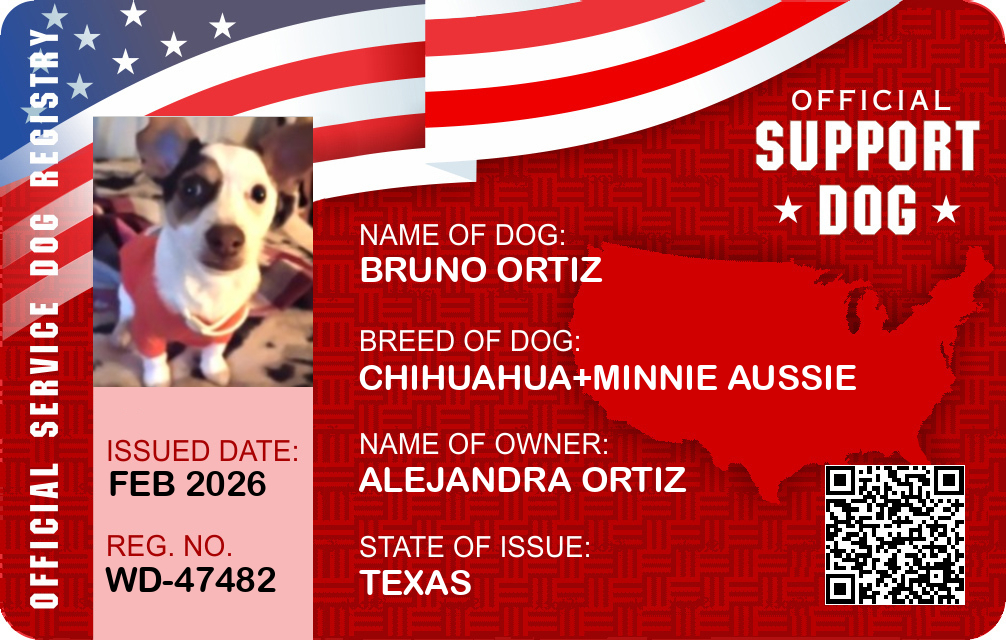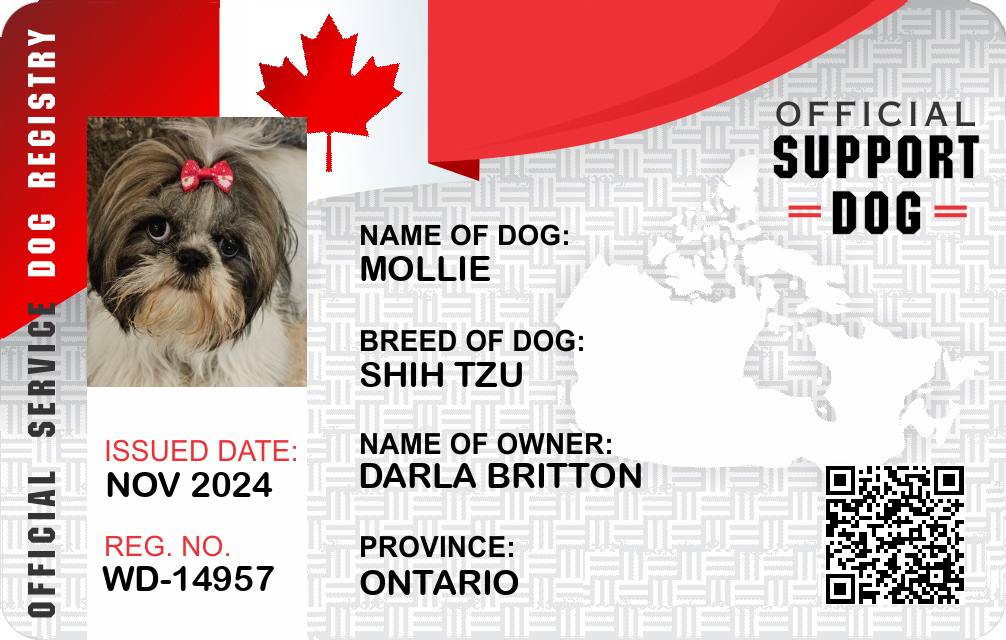North Carolina Service Dog Laws
Get Your Documents
Example State Cards


Overview of Service Dog and Legal Definitions in North Carolina
What is a Service Dog?
A service dog is defined as a dog that has been individually trained to perform tasks or do work for a person with a disability. This includes physical, sensory, psychiatric, intellectual, or other mental disabilities. The key aspect of this definition is the individualized training, which distinguishes service dogs from other types of assistance animals. The tasks or work the dog performs must be directly related to the person’s disability. Unlike regular pets, service dogs are considered working animals and are thus afforded specific legal protections under both federal and state law.
How Service Dogs Differ from Other Types of Assistance Animals
Service dogs are distinct from other assistance animals, such as emotional support animals or therapy animals, in that they are trained to perform specific tasks. Emotional support animals provide comfort through their presence but are not required to perform specific duties to aid with a disability. Therapy animals, often used in treatment or educational settings, provide comfort or support to multiple people rather than performing individualized tasks for one person. The differentiation in roles affects the legal rights and accommodations granted to these animals and their handlers under various laws.
Key Federal Laws Affecting Service Dogs (e.g., ADA, FHA, ACAA)
The Americans with Disabilities Act (ADA) is the primary federal law that governs the use of service dogs, ensuring access to public spaces and prohibiting discrimination against individuals with disabilities. The ADA requires businesses, governments, and other entities to accommodate service dogs, unless doing so would fundamentally alter the nature of the goods/services provided. The Fair Housing Act (FHA) allows for service and assistance animals in housing, prohibiting discrimination by landlords. The Air Carrier Access Act (ACAA) ensures that service dogs can travel with their handlers on flights.
State-Specific Service Dog Laws in North Carolina
Housing Rights and Responsibilities
In North Carolina, housing laws align closely with the FHA, allowing individuals with disabilities the right to have their service dogs reside with them, regardless of pet policies. Landlords are not allowed to charge additional pet fees for service dogs; however, handlers may be responsible for any damage caused by the animal. If a landlord questions the service dog’s legitimacy, they can ask for verification of the handler’s disability and the necessity of the animal. However, they cannot demand details about the nature or extent of the disability.
Public Access and Accommodation
Under both federal and North Carolina law, individuals with service dogs are granted access to public places such as restaurants, hotels, and stores. These establishments must allow service dogs to accompany their handlers in all areas where the public is normally permitted. However, if a service dog is out of control and the handler does not take effective action to manage it, or if the dog is not housebroken, the business may request its removal. In such cases, the establishment must still offer services to the handler without the dog present.
Transportation and Travel Rules
Service dog handlers in North Carolina also have specific rights and protections when it comes to transportation and travel. Under the ADA and state law, service dogs are allowed on public transportation systems, such as buses and trains. The ACAA provides for service dogs to fly in the cabin with their handlers without additional fees, though airlines may request certain documentation and advance notice. It’s important for handlers to familiarize themselves with an airline’s policies ahead of travel to avoid any disruptions.
Employment and Workplace Considerations
In the workplace, the Americans with Disabilities Act extends to North Carolina, requiring employers to provide reasonable accommodations for employees with disabilities, which may include allowing the presence of a service dog. Employers may ask for documentation of the disability and the need for a service dog but cannot require extensive medical records. It’s important that employees communicate their needs to employers clearly to ensure a mutual understanding and compliance with legal requirements.
Documentation, Requirements, and Processes in North Carolina
Service Dog Documentation and Who Can Issue It
In terms of documentation, while North Carolina does not have a state-specific requirement for service dog certification, documentation may be requested to verify the need for a service dog in certain situations, such as housing or air travel. Typically, a statement from a healthcare professional indicating that the handler has a disability and that the service animal is needed will suffice. There is no official state certification program, and any training certificates are generally issued by the training organization.
Landlord, Business, and Provider Verification Rules
Verification by landlords, businesses, and service providers must comply with legal limitations to avoid discrimination. For businesses and public accommodations, the ADA limits questions about a service dog to two inquiries: whether the dog is required because of a disability and what work or task the dog has been trained to perform. Landlords and housing providers may require verification that the dog is necessary for the individual’s disability but must tread carefully to remain within legal boundaries, focusing on accommodating rather than barring access.
Rights, Limitations, and Legal Risks
Rights Service Dog Handlers Have in North Carolina
Service dog handlers in North Carolina enjoy robust protections under both federal and state law. These include the right to non-discriminatory access to public spaces, housing, and transportation, alongside workplace accommodations. The laws aim to balance the need for access with the rights of businesses and service providers, ensuring handlers are not unfairly burdened by their disabilities.
Limits on Service Dog Protections and Common Restrictions
Despite these significant rights, there are limitations to the protections afforded. For instance, service animals are not allowed access if they pose a direct threat to the health or safety of others, are out of control, or if their presence fundamentally alters the nature of the service or goods provided. Additionally, service animals must be dogs and must be trained to perform tasks directly related to the handler’s disability; other animals or untrained dogs do not qualify under the ADA.
Penalties for Fraud or Misrepresentation
In North Carolina, as in many states, misrepresenting a pet as a service animal is considered a violation of law and can lead to penalties. This misrepresentation undermines genuine needs and can result in fines and other legal repercussions. The state takes these violations seriously to maintain the integrity of service animal use and ensure that individuals with disabilities have appropriate access without fraudulently imposed barriers.
Practical Guidance for Service Dog Handlers in North Carolina
How to Qualify for a Service Dog Legitimately
To qualify for a service dog in North Carolina, individuals should have a documented disability that necessitates a service dog to perform specific tasks. Consulting with healthcare professionals can help ascertain the need for a service animal, and legitimate service schools or trainers can provide guidance and training for both the dog and the handler. Legitimate qualification ensures legal protections and access under the law.
How to Talk to Landlords, Airlines, and Employers
Communicating effectively with landlords, airlines, and employers involves being knowledgeable about your rights and prepared to offer necessary documentation without over-disclosing personal medical information. It’s often helpful to provide clear, concise explanations of the service dog’s role and how it assists with the handler’s disability. Being proactive and courteous can help foster a cooperative environment conducive to resolving potential access issues.
Summary of Service Dog Laws in North Carolina
- Definition and Role: Service dogs are individually trained to perform tasks for individuals with disabilities.
- Public Access: Broad access is provided under ADA, with exceptions for safety and control issues.
- Housing: Service dogs are allowed under FHA regulations, with limitations on fees and conditions.
- Employment: Employers must provide reasonable accommodations for service dogs.
- Documentation: Handlers may be required to furnish basic documentation, generally issued by health professionals.
- Misrepresentation Penalties: False claims about a service dog’s status can result in fines and legal challenges.
- Practical Tips: Handlers should stay informed, provide clear documentation, and communicate effectively with relevant parties.
In summary, North Carolina’s service dog laws integrate federal protections while outlining specific requirements for public access, housing, and workplace accommodations. Handlers should be mindful to comply with documentation needs, honor restrictions on access, and understand their rights to ensure successful engagement in public life and personal affairs.
Get Your Documents
Example State Cards













